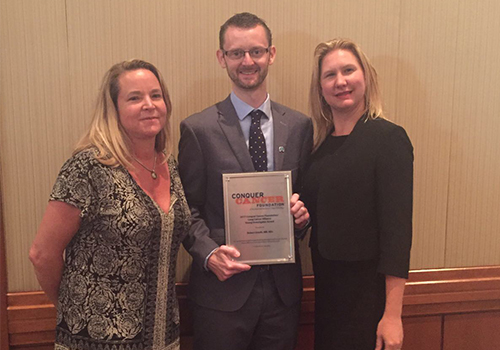By Dr. Robert Smyth, MB, MSc
As a trainee in pulmonary medicine, lung cancer has long interested me. It is the leading cancer killer worldwide and estimated to be responsible for 1.6 million deaths, about a fifth of all deaths caused by cancer. The highest estimated rates of lung cancer occur in Europe and North America, but with an estimated 300 million smokers in China, Asia is now also at the forefront of this continuing global battle with 51% of the world’s lung cancer cases. Despite lung cancer’s impact worldwide, many in rural areas and less developed countries are not able to access quality care and treatment for the disease.
Over the past few decades, there have been changes in the types of lung cancer diagnosed, as well as the areas of the lung where they originate. This has made bronchoscopies, a standard procedure to test for lung cancer which uses a small camera to see inside a person’s airway, much harder. Due to this, doctors and researchers are working on new ways to find and diagnose lung cancer.
One new method that is becoming more accepted in the medical community is “liquid biopsy.” Liquid biopsies use a blood sample or another type of fluid sample to not only detect lung cancer and reveal if treatment methods are working, but also for genetic testing which helps determine if a patient might benefit from targeted therapy or immunotherapy treatment.

Lung Cancer Alliance staff, Emily Eyres (left) and Jennifer King (right) award the 2017 Conquer Cancer Foundation (CCF) – Lung Cancer Alliance Young Investigator Award to Dr. Rob Smyth (center).
Standard tissue biopsies are still the most accurate method to detect lung cancer, however may result in complications like collapsed lungs. Researchers are working on improving the accuracy of liquid biopsies, so that one day they might replace standard tissue biopsies.
My own research, in Professor Hennessy’s lab in the Royal College of Surgeons in Ireland, has been focused on detecting gene changes, specifically the epidermal growth factor receptor (EGFR) T790M mutation, in lung cancer using a patient’s breath. Most patients with an EGFR mutation respond well to targeted therapy treatments specific to that mutation like Tarceva, Gilotrif and Iressa. However, if the tumor of an EGFR-positive patient contains the T790M mutation, then normal targeted therapies won’t work. That being said, Tagrisso, another EGFR targeted therapy, has shown to work well. Because of this, being able to easily and accurately find out if a patient has the T790M mutation is very important for treatment decisions.
The breath test I am working on is easy to administer and may even work better than blood tests for finding the EGFR T790M mutation, based on results from the first few patients who have received it.
Our goal is to create a method to find and monitor EGFR-positive lung cancer that is non-invasive, inexpensive, accurate and accessible to all. We hope these developments will lead to providing more people across the world with more information about their cancer and thus better treatment options and lives saved.
Despite these rapid advances, a relative lack of funding for lung cancer research compared to other cancer types will continue to slow our progress to date. We must continue our efforts to advocate for those impacted by the disease, raise awareness in order to reduce stigma and build on the hope and optimism that now exists for patients with lung cancer.
Dr. Robert Smyth, MB, MSc is the recipient of the 2017 Conquer Cancer Foundation – Lung Cancer Alliance Young Investigator Award. Through this program, Lung Cancer Alliance funds promising young researchers in the field of lung cancer.

Leave A Comment